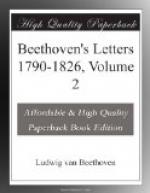My opera, “Fidelio,” was performed with much applause in Dresden at the festivities there in honor of the visit of the King of Bavaria, when their Majesties were all present. I received this intelligence from the above-named director-general, who asked me for the score through Weber, and afterwards sent me really a very handsome present in return. I hope Y.R.H. will excuse my intruding such a request on you, but Y.R.H. knows that I am not usually importunate. Should, however, the slightest obstacle arise to render my request disagreeable to you, I shall not be the less convinced of your generosity and kindness. Neither avarice, nor the love of speculation, which I have always avoided, prompted this scheme; but necessity compels me to use every effort to rescue my self from my present condition. Candor is best, for it will prevent my being too hardly judged. Owing to constant ill health, which has prevented my writing as usual, I have incurred a debt of 200 to 300 florins C.M.,[8] which can only be discharged by vigorous exertions on my part. If my subscription succeeds better than it has hitherto done, it will be an effectual help, and if my health improves, of which there is every hope, I shall be able once more to resume my compositions with fresh energy. In the mean time I trust Y.R.H. will not be offended by my candor. Had it not been the fear of being accused of not sufficiently bestirring myself, I would have persevered in my usual silence. As to the recommendation, I am at all events convinced that Y.R.H. is always glad to effect good results for others when possible, and that you are not likely to make any exception in my case.
[Footnote 1: This Sonata, Op. 111, dedicated to the Archduke Rudolph, was composed in 1822, and published by Schlesinger in the beginning of 1823.]
[Footnote 2: These Variations are, no doubt, the 33 C major Variations for pianoforte, Op. 120, on a waltz of Diabelli’s, dedicated to Madame Brentano, composed in 1823, and published in the June of the same year.]
[Footnote 3: The Grand Mass in D.]
[Footnote 4: The symphony which Beethoven declared he had completed in fourteen days was the 9th in D minor, composed in 1822 or 1823, first performed on the 7th May, and published in 1826.]
[Footnote 5: The Archduke’s Variations alluded to by Beethoven are not published or now known.]
[Footnote 6: In a letter from the Archduke Rudolph of July 31, 1823, he says, “My brother-in-law, Prince Anton, has written to me that the King of Saxony is expecting your beautiful Mass.”]
[Footnote 7: The director-general of the musical Court band and opera in Dresden (1823) was Von Koenneritz.]
[Footnote 8: This debt of 200 to 300 florins had only been incurred by Beethoven in order not to sell out his shares in the Austrian Loan; he was in no need.]
337.
TO SCHINDLER.
Hetzendorf, July 1, 1823.




